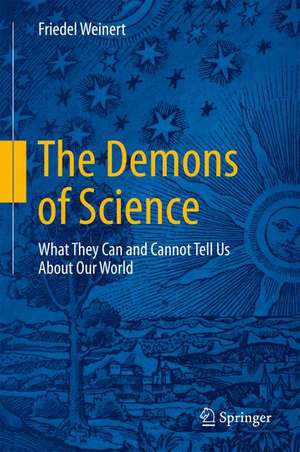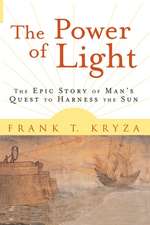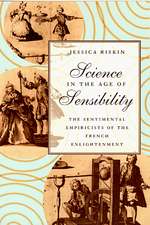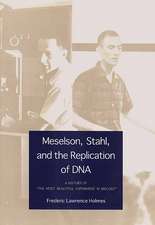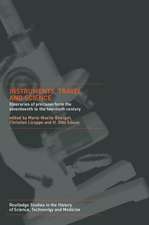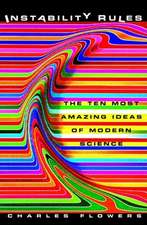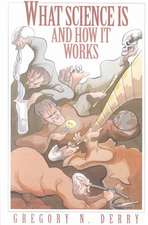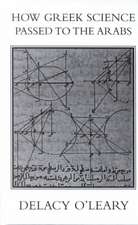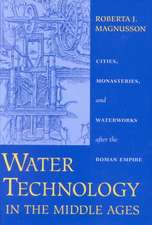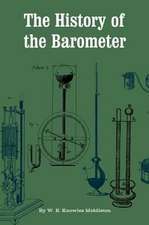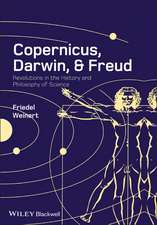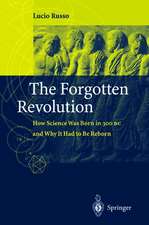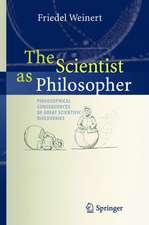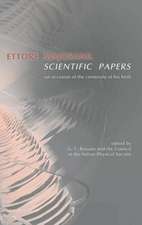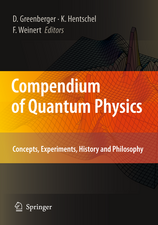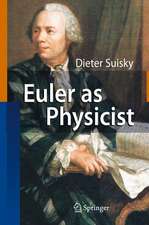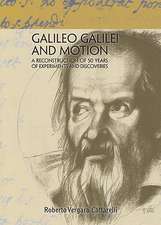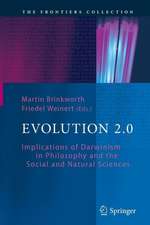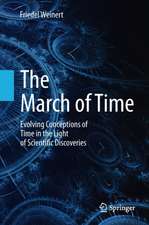The Demons of Science: What They Can and Cannot Tell Us About Our World
Autor Friedel Weinerten Limba Engleză Hardback – 27 mai 2016
| Toate formatele și edițiile | Preț | Express |
|---|---|---|
| Paperback (1) | 638.76 lei 6-8 săpt. | |
| Springer International Publishing – 30 mai 2018 | 638.76 lei 6-8 săpt. | |
| Hardback (1) | 644.95 lei 6-8 săpt. | |
| Springer International Publishing – 27 mai 2016 | 644.95 lei 6-8 săpt. |
Preț: 644.95 lei
Preț vechi: 758.77 lei
-15% Nou
Puncte Express: 967
Preț estimativ în valută:
123.44€ • 127.21$ • 104.22£
123.44€ • 127.21$ • 104.22£
Carte tipărită la comandă
Livrare economică 04-18 martie
Preluare comenzi: 021 569.72.76
Specificații
ISBN-13: 9783319317076
ISBN-10: 3319317075
Pagini: 237
Ilustrații: IX, 251 p. 40 illus., 8 illus. in color.
Dimensiuni: 155 x 235 x 16 mm
Greutate: 0.54 kg
Ediția:1st ed. 2016
Editura: Springer International Publishing
Colecția Springer
Locul publicării:Cham, Switzerland
ISBN-10: 3319317075
Pagini: 237
Ilustrații: IX, 251 p. 40 illus., 8 illus. in color.
Dimensiuni: 155 x 235 x 16 mm
Greutate: 0.54 kg
Ediția:1st ed. 2016
Editura: Springer International Publishing
Colecția Springer
Locul publicării:Cham, Switzerland
Cuprins
I. Thought Experiments: Thought Experiments in Ancient Greece.- What Thought Experiments Represent.- Models and Thought Experiments.- The Function of Thought Experiments.- What Thought Experiments Tell Us and Don’t Tell Us About theWorld.- Enter theDemons.- II. Laplace's Demon: Laplace’s Demon: Causal and Predictive Determinism.- Causality, Determinism and the Block Universe.- The Time-Reversal Invariance of Fundamental Laws.- Determinism and Its Implications.- Determinism and Free Will.- What Laplace's Demon Tells Us and Does not Tell Us About the World.- III. Maxwell's Demon: Local and Cosmic Arrows of Time.- Maxwell’s Demon.- Loschmidt’s Demon: Reversibility and Irreversibility.- Indeterminism.- Indeterminism and Free Will.- Entropy.- The Past-Future Asymmetry.- What Maxwell’s Demon Tells Us and Does not Tell Us About the World.- IV. Nietzsche's Demon: The Eternal Recurrence of Events.- Landsberg’s Demon.- Physical and Phenomenal Time.- The Evolution of the Universe.- Time and Change.- Is There a MasterArrow of Time?.- What Landsberg’s Demon Tells Us and Doesnot Tell Us About the Arrows of Time.
Notă biografică
Friedel Weinert is professor of history and philosophyof science at the University of Bradford in the UK. He is the author of severalbooks about the interactions of science and philosophy – The Scientist as Philosopher (2004); Copernicus, Darwin and Freud(2009); The March of Time (2013)– as well as editor of Laws of Nature (1995) and co-editor of Compendium of Quantum Physics (2009) and Evolution 2.0 (2012).
Textul de pe ultima copertă
This book is the first all-encompassing exploration of the role of demons in philosophical and scientific thought experiments. In Part I, the author explains the importance of thought experiments in science and philosophy. Part II considers Laplace’s Demon, whose claim is that the world is completely deterministic. Part III introduces Maxwell’s Demon, who - by contrast - experiences a world that is probabilistic and indeterministic. Part IV explores Nietzsche’s thesis of the cyclic and eternal recurrence of events. In each case a number of philosophical consequences regarding determinism and indeterminism, the arrows of time, the nature of the mind and free will are said to follow from the Demons’s worldviews. The book investigates what these Demons - and others - can and cannot tell us about our world.
Caracteristici
Demonstrates the central role that thought experiments can play in scientific reasoning and explores their deep philosophical consequences, with special emphasis on demons Written primarily for an academic audience, but also accessible to the interested layperson Inspires readers to question their existing assumptions about matters such as determinism and indeterminism Also addresses the nature of the mind, free will, an the arrows of time Includes supplementary material: sn.pub/extras
